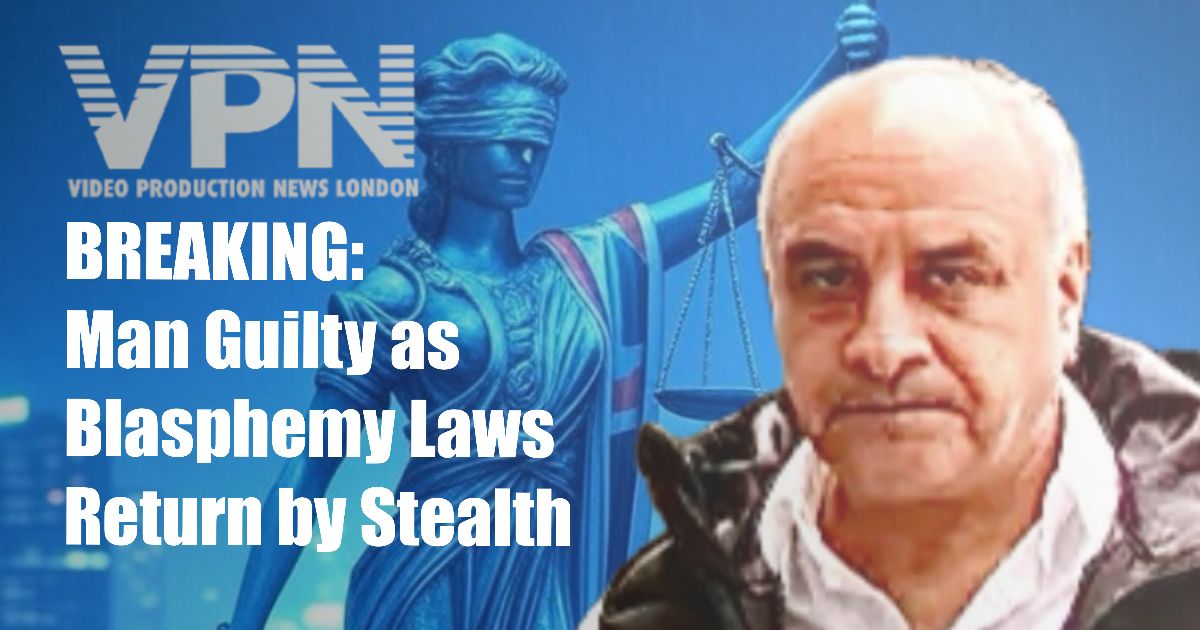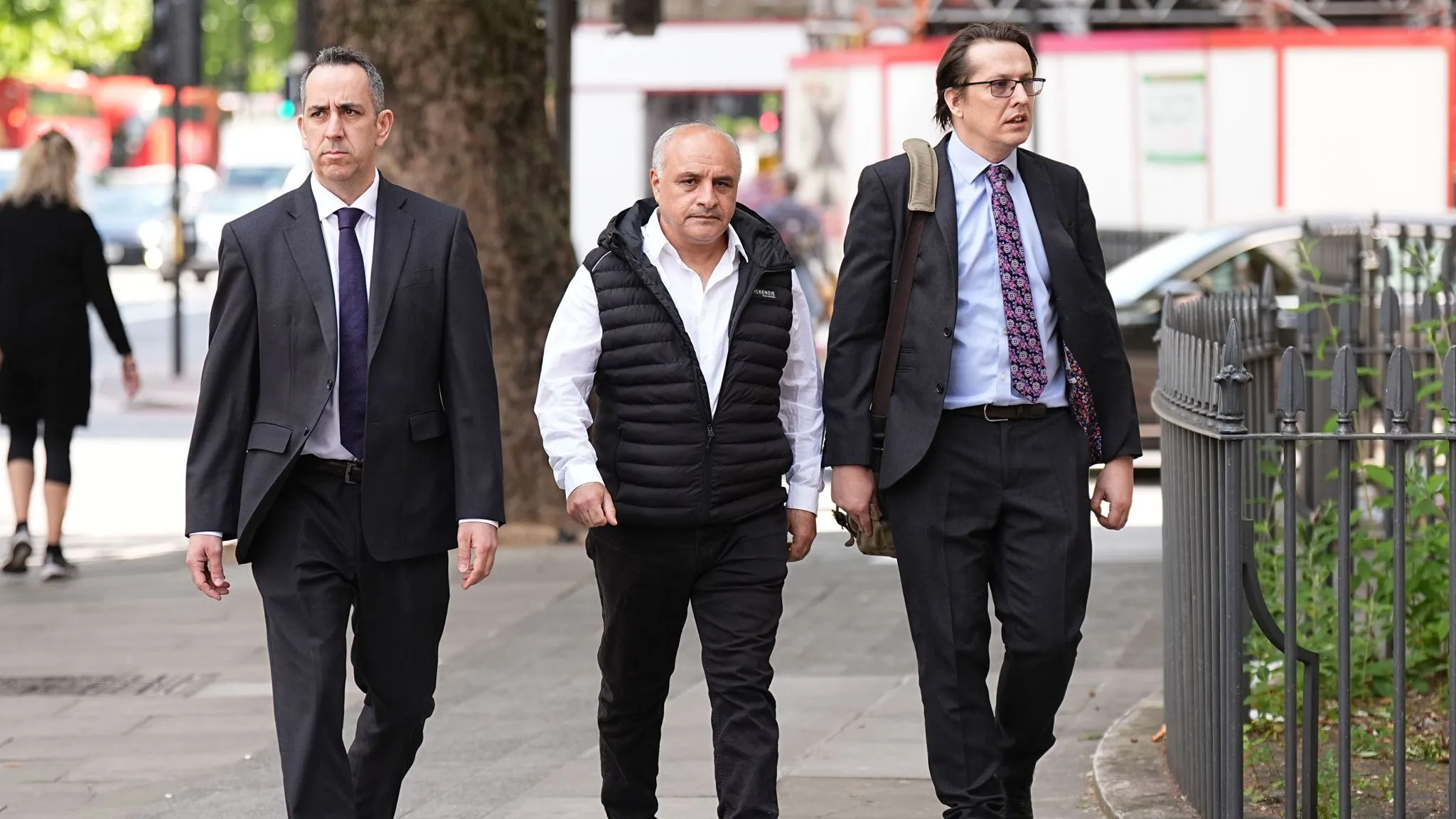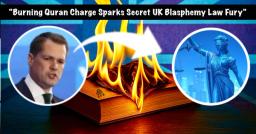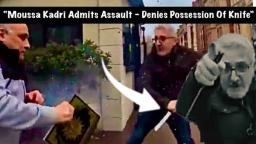Quran Burner GUILTY: UK Court Sparks Free Speech Fury!
Shocking courtroom drama as man found guilty of a religiously aggravated public order offence— fuels national fears of a de-facto blasphemy law returning and a threat to free speech in Britain.
Hamit Coskun, a 50-year-old man of Kurdish and Armenian heritage, has been found guilty of a religiously aggravated public order offence after publicly burning a copy of the Quran outside the Turkish Consulate in London on 13 February 2025. The verdict was delivered at Westminster Magistrates’ Court, where District Judge John McGarva imposed a £240 fine, with a further £96 statutory surcharge.
The case, which has attracted national and international attention, began when Coskun travelled from his home in the Midlands to Rutland Gardens in Knightsbridge. There, shortly before 2pm, he ignited a Quran while shouting “F*** Islam”, “Islam is religion of terrorism” and “Quran is burning.”
The incident was filmed in its entirety by a Video Production News affiliate cameraman AY_AUDITS who was present throughout the demonstration and also captured the moment Coskun was physically assaulted by Moussa Kadri, 59,which is now the subject of a seperate court case that is currently ongoing.
In the video, the man confronting Coskun brandishes a knife or similar bladed article arguing his motives and calling him a "f****** idiot" the footage also shows Coskun using the burning Quran to defend himself, before backing away.
Moments later, the man can be seen slashing at Coskun again, before Coskun stumbles and falls to the ground. The flaming Quran drops beside him. The attacker then spits on and kicks Coskun, stating: “Burning the Quran? It’s my religion. You don’t burn the Quran.”
The court had previously heard arguments from Coskun’s defence counsel, Katy Thorne KC, that in bringing this case at all, namely the criminalising of the act of burning a religious text, no matter how offensive, was an affront to foundational principles of democratic society.
“To render such an act a criminal offence is submitted that the Crown Prosecution Service, in bringing the case at all, was “seeking to introduce a law unknown to this land”
Namely:
"To render such an act a criminal offence is tantamount to reintroducing a blasphemy law in relation only to Islam,”
she said.
“It would render the Qur’an a specially protected object in the UK where a flag or another book would not be.”
Coskun’s defence highlighted his background: born in Turkey, with both Kurdish and Armenian heritage, Coskun is an outspoken critic of the Turkish government.
He maintained that his intention was not to incite hatred or violence but to protest against the Turkish government’s increasing alignment with Islamic conservatism. Prosecutors noted that Coskun had previously used social media to criticise Turkish President Recep Tayyip Erdoğan, who he described as having “made Turkey a base for radical Islamists” and accused of attempting to impose a Sharia-led regime.
Thorne told the court that Coskun’s intention was not to incite hatred against Muslims, but to protest religious authoritarianism. She warned that the case represented a dangerous
“Backdoor reintroduction of blasphemy laws.”
The prosecution contended that Coskun’s behaviour constituted religiously aggravated disorderly conduct likely to cause harassment, alarm or distress, under the Public Order Act 1986 and the Crime and Disorder Act 1998. He denies both the main charge and an alternative count of non-aggravated disorderly behaviour.
During summing up, District Judge McGarva said that although freedom of speech was a protected right, it is not absolute. The judge accepted the prosecution’s assertion that Coskun’s language and actions were motivated, at least in part, by hostility towards Muslims, rather than solely against Islam as an ideology or against the Turkish state.
He ruled that the burning and accompanying statements were likely to cause harassment, alarm or distress, and therefore fell within the threshold of a public order offence.
Outside court, Coskun expressed disappointment in the verdict and signalled his intention to appeal. He maintains that the prosecution sets a dangerous precedent for suppressing politically and religiously charged expression.
The National Secular Society (NSS), which along with the Free Speech Union funded Coskun’s defence, issued a strong statement criticising the outcome. NSS chief executive Stephen Evans said:
“The outcome of this case is a significant blow to freedom of expression and signals a concerning capitulation to Islamic blasphemy codes. The court’s acceptance of the idea that Coskun’s protest was motivated by hostility towards Muslims rather than religion itself raises serious concerns. It is essential to differentiate between prejudice or hatred aimed at individuals and hostility towards the ideologies of Islam or Islamism.”
Evans continued: “The conviction of Mr Coskun on the grounds that his actions were ‘likely’ to cause harassment, alarm, or distress suggests a troubling repurposing of public order laws as a proxy for blasphemy laws. This jeopardises freedom of expression by establishing a ‘heckler’s veto’ that incentivises violent responses to suppress views deemed offensive.”
Humanists UK also weighed in ahead of the verdict, warning that a conviction could lead to the de facto reintroduction of blasphemy laws, and have a chilling effect on religious dissent in the UK. A spokesperson said:
“This would have profound consequences, not only for free expression in the UK but for the safety and wellbeing of hundreds of thousands of so-called apostates, ex-Muslims and critics of religion. It threatens their right to freedom of thought and conscience.”
The Government has denied any plans to reintroduce blasphemy laws. However, a recent intervention in Parliament by Labour MP Tahir Ali, calling on Prime Minister Keir Starmer to commit to new laws prohibiting the desecration of all Abrahamic religious texts and prophets, has reignited public debate. In response, ministers reiterated that the UK government would not pursue legislation resembling blasphemy laws.
Nonetheless, many legal commentators argue that this verdict has already effectively done so via judicial interpretation. In a commentary published by the National Secular Society, it was stated: “Such an erosion of free speech is detrimental to community relations. Social cohesion is best achieved not by restricting rights but by fostering their free exercise.”
While the immediate outcome is a relatively minor financial penalty, the broader implications for press freedom and expression in Britain are considerable. Critics warn that this case will set a precedent that could lead to further criminalisation of speech deemed offensive by vocal or aggressive groups.
As this case continues to resonate across civil liberties organisations and legal circles, Video Production News will continue to monitor its wider repercussions for law, protest, and the right to challenge religious and political institutions.
Editor’s Footnote – A Note on Freedom of Expression
At Video Production News, we remain committed to the core journalistic principle of freedom of speech and expression, which is fundamental to any democratic society and a free press. While we do not endorse or condone the destruction of any text—religious or otherwise—we acknowledge that the legal and societal implications of this case raise important questions about the boundaries of expression and the evolving role of law in relation to matters of belief.
We are particularly alert to the risk of what may amount to a de facto reintroduction of blasphemy laws, through the backdoor of public order or hate speech legislation. Such developments, however well-intentioned, must be scrutinised to ensure they do not infringe on lawful expression or lead to the censorship of dissenting ideas.
We believe that no ideas or beliefs, religious or secular, should be shielded from criticism or protected from scrutiny under threat of legal sanction, provided such expression does not incite violence or hatred. As such, we continue to monitor cases such as this closely, mindful of the delicate balance between upholding public order and safeguarding the hard-won liberties that should underpin our free and open society here in the UK.
As always, our reporting remains impartial and professional. But we will never cease to defend the freedoms that make such journalism possible.
Well, that’s all for now. But until our next article, please stay tuned, stay informed, but most of all stay safe, and I’ll see you then.
Credit to AY_AUDITS - For Original Reporting:






